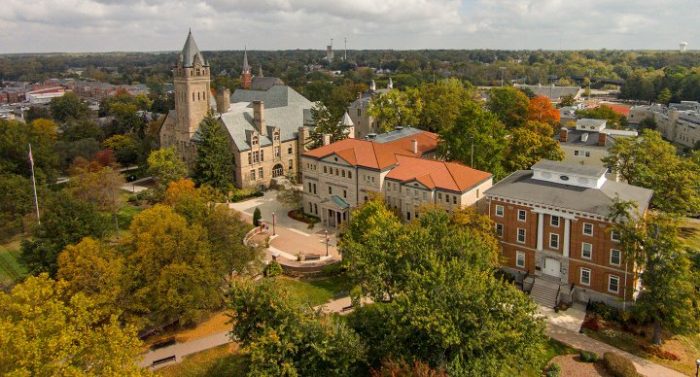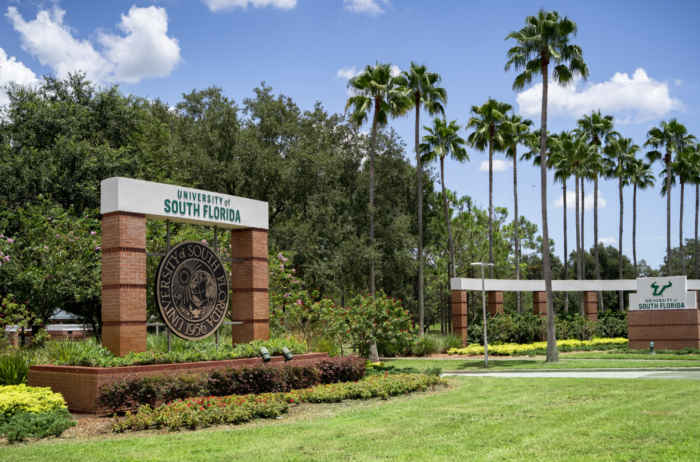

External awards increase awareness of the faculty member’s work, foster interdisciplinary connection, create opportunities for collaboration and student engagement, and contribute to new knowledge and solutions for global issues.

For over a decade, the Faculty Honors office at the University of South Florida (USF) has supported faculty members in applying for external honorific awards and boosted recognition of faculty success. In doing so, they have created a space for faculty members outside of their home departments with a strong culture of recognition, collaboration, support, and mentorship that has helped faculty members to flourish.
The impact of external awards on a faculty member’s career and work can be significant, says Victoria Stuart, the director of USF Faculty Honors, Prizes, and Awards. They increase awareness of the faculty member’s work, foster interdisciplinary connection, create opportunities for collaboration and student engagement, and contribute to new knowledge and solutions for global issues. Until fairly recently, seeking out and applying for such awards was seen as the responsibility of individual faculty members, some of whom were more inclined to do so than others. While universities were pleased when faculty received external awards, there was very little infrastructure to support their applications.
Applying for these awards, however, entails complex, time intensive processes that often present a significant challenge for faculty members who are already stretched thin. In recent years, the landscape of higher education has changed, and the demands on faculty have intensified, with an ever-expanding portfolio that includes research, teaching, service, public engagement, and the pursuit of external funding. The bandwidth that remains for seeking external awards is limited, and this has created a need for centralized support programs. The USF Honors team, which includes Stuart and two assistant directors, Nazek Jawad and Colleen Parker, manages much of the backend work, including gaining a deep understanding of faculty research and identifying opportunities to highlight and elevate their contributions. They proactively bring these opportunities to faculty’s attention and offer assistance with the application process for those interested in pursuing them. Once a faculty member receives an award, the team ensures that everyone in that faculty member’s network, including senior administrators, is notified.

External awards increase awareness of the faculty member’s work, foster interdisciplinary connection, create opportunities for collaboration and student engagement, and contribute to new knowledge and solutions for global issues.
To fully serve USF’s 2000+ faculty members––including tenured, tenure-track, and nontenured––the USF Faculty Honors team developed collaborative relationships with other offices across the university. Early on, they developed a strong relationship with Carissa Vetromile and Dianne Donnelly, both of whom are assistant deans of research in the College of Arts and Sciences, where they are part of a robust pre-award system. Vetromile and Donnelly help faculty members find external funding; they therefore know the faculty members in CAS extremely well. The two teams meet regularly to discuss the honorific awards that are available, and identify faculty who are interested in the awards. This collaboration has provided a model for similar partnerships between Faculty Honors and other units across the colleges.
In the course of this collaboration with CAS, Stuart and her colleagues realized that humanities faculty, in particular, were being underserved. There was less information available to humanities faculty about how to apply for awards, and so it was much more time intensive for them to do so. The Faculty Honors team felt like they needed to do more to help faculty in the humanities become aware of the awards available to them and to bring their work to the forefront; their general workshops simply weren’t enough. They began offering virtual workshops for humanities faculty that focused on particular awards to help faculty identify and navigate those unique award cycles, confirm eligibility requirements, and plan for the award timeline to coincide with their career and research goals.
As the USF Faculty Honors team built their program for humanities scholars, they also began speaking with an increasing number of early-career faculty. Awards, Stuart says, can have a domino effect on a faculty member’s career. Faculty can start very early by applying for first book awards in their fields, for example, and that sets them up for mid-and late-career awards. But early-career faculty are sometimes hesitant to apply for things, because they feel that they are not yet “ready.” The USF Faculty Honors team developed an early-career awards workshop that has become extremely popular, and they now invite past award recipients to come to the workshops as peer mentors.
[The Faculty Honors team] didn’t make me feel like a task. The way they integrated us into the larger faculty community is so seamless, and now I’m sharing my applications and my tips. Esra Akin-Kivanc
One such award recipient-turned-peer mentor is Esra Akin-Kivanc F’17, a scholar of art and architecture of the Middle East and North Africa. She received support from the Faculty Honors program in applying to an ACLS Fellowship and a National Endowment for the Humanities (NEH) Summer Stipend as an assistant professor. Now she helps mentor others. “[The Faculty Honors team] didn’t make me feel like a task,” Akin-Kivanc says. “The way they integrated us into the larger faculty community is so seamless, and now I’m sharing my applications and my tips.”
The workshops that the Faculty Honors team have developed, Akin-Kivanc says, help faculty members leave their silos and exchange ideas and information with colleagues from other disciplines whom they would otherwise never meet. This fosters a sense of the university as a whole, rather than individual faculty members as islands.
Akin-Kivanc emphasizes how critically important the Faculty Honors program was for her as she advanced through her tenure process. What makes the program unique, she says, is that as she grew as a scholar, the program grew with her and supported her in ways that fit her evolving needs and pushed her to think beyond the next fellowship. She contrasts this with other programs that provide static application templates –– which may seem more efficient from a bureaucratic perspective but ultimately are not. “Dynamic dialogues with real people are efficient,” she says.
Although at first glance, a program like USF Faculty Honors may appear to be about individual achievement and prestige, Stuart, Jawad, and Parker have structured the program in a way that creates a space for faculty that allows for multidisciplinary exchange, collaboration, support, and encouragement. Centralized support is especially important for faculty members who may be plagued by imposter syndrome and who always think they need to do more before they are ready to apply for an award. The Faculty Honors team approaches this by widely publicizing and celebrating the awards that faculty receive, to create a culture of recognition that both inspires and empowers faculty to see possibilities for themselves.
Through this robust cycle of collaboration, support, and recognition, the number of awards received by USF faculty has doubled in the 10 years since the program was created. The Faculty Honors team is contacted regularly by other institutions that wish to replicate their work. In terms of goals for the future, Stuart says, “This is my heartfelt goal––that we will establish such a vibrant culture of recognition and nomination that the peer to peer interaction will be self-sustaining.”
A community for sharing and uplifting the work of creating more just, humane, and innovative colleges and universities